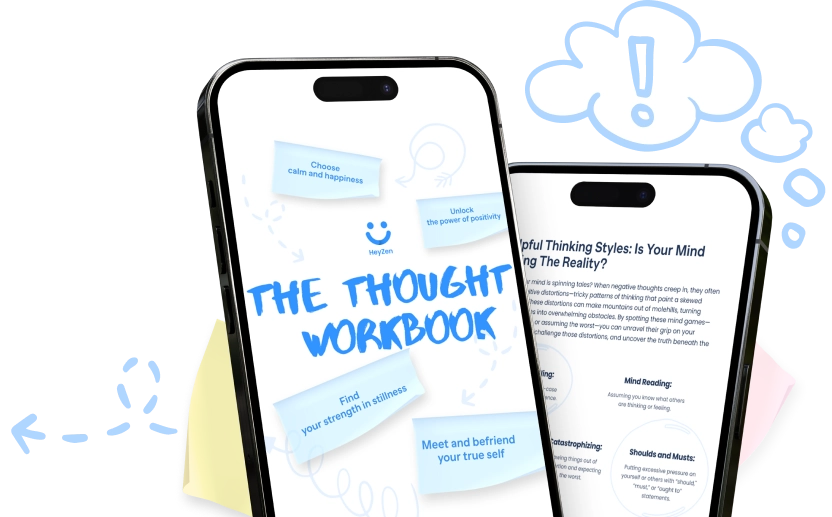Stop Overthinking Your Relationship: 7 Proven Strategies for a Happier Love Life

Do you find yourself constantly analyzing every aspect of your relationship, questioning your partner’s feelings, or imagining worst-case scenarios? If so, you’re not alone! It’s a habit that can be difficult to break, but with the right strategies, you can learn to quiet your mind and appreciate your significant other for who they are.
In this article, we’ll explore all the effective techniques to help you build trust with your partner, improve communication, stop overthinking at night, and develop a more positive mindset.
Whether you’re dealing with anxiety relief or seeking ADHD relief, these tips will guide you toward a more relaxed and confident approach to your relationship. So, let’s dive into it!
Key Takeaways
- Recognize common signs of overthinking, such as constant worry, obsessing over past events, and visualizing worst-case scenarios.
- Address root causes like emotional discomfort, fear, and lack of trust to break the cycle of excessive analysis.
- Implement strategies like gaining self-awareness, developing trust, practicing mindfulness, and challenging negative thought patterns.
- Use emotional regulation techniques, i.e., breathing exercises, grounding methods, and positive reframing.
- Build a healthier relationship mindset by focusing on the present, cultivating gratitude, and embracing self-acceptance.
- Seek support through open communication with your partner, connecting with empathetic listeners, and considering professional help options.
Understanding Relationship Overthinking
Relationship overthinking involves excessive analysis of your partner’s behavior, words, and actions. It’s a common issue that often leads to anxiety and stress inside a couple.
Common Signs of Overthinking
- Non-stop stream of worrying or anxious thoughts.
- Obsessing over past events, conversations, or interactions.
- Dissecting interactions for hours or days to decipher their meaning.
- Feeling anxious about the future.
- Planning and specifying every possible outcome and potential problem.
- Visualizing worst-case scenarios and “what-ifs”.
- Struggling to make decisions, even regarding simple choices.
- Paralysis in decision-making due to fear of making the wrong choice.
- Attempting to forecast every possible outcome.
Root Causes of Overthinking in Relationships
- Emotional discomfort: Overthinking about potential issues to justify negative feelings.
- Fear and doubt: Worried thoughts about the future driven by insecurity.
- Misinterpretation: Searching for hidden meanings and developing false narratives.
- Low self-esteem: Personalizing a partner’s behavior and doubting one’s worth.
- Lack of trust: Struggling to believe a partner’s actions are genuine.
- Fear of conflict: Walking on eggshells to avoid disagreements.
- Attachment issues: Labeling oneself as “needy” and withholding bids for connection.
- Past experiences: Previous relationship traumas influencing current perception.
Strategies to Stop Overthinking
Gain Self-Awareness and Challenge Negative Thought Patterns
Developing self-awareness is crucial for managing your thoughts and emotions, so:
- Start by acknowledging your thinking patterns without judgment and simply becoming aware of them.
- Recognize common cognitive distortions, such as catastrophizing or mindreading.
- Take a moment to pause and reflect on your thoughts, asking yourself if they’re based on facts or assumptions. Then, ask yourself if there are alternative explanations or perspectives you haven’t considered.
- Reframe negative thoughts into more balanced and realistic ones.
- Start journaling to explore your feelings and identify recurring themes.
Develop Trust and Communication
Open and honest communication forms the foundation of a healthy relationship, so try the following:
- Instead of making assumptions about your partner’s thoughts or feelings, express your concerns directly. A loving partner will deal with your worries together with you and won’t leave you with your thoughts alone.
- Engage in regular check-ins with your significant other to discuss any issues or insecurities. During them, practice active listening and empathy to create a safe space for both of you. This way, you’ll feel free to share your perspectives and bothersome thoughts.
Practice Mindfulness and Presence
Mindfulness techniques can help you stay grounded in the present moment, reducing the tendency to dwell on past events or future scenarios, so:
- Incorporate daily mindfulness exercises, such as deep breathing or meditation, into your routine. When you find yourself spiraling into overthinking, you’ll always be able to reconnect with your surroundings via the mental skills learned through mindfulness.
- To interrupt the cycle of rumination and quickly bring yourself back to the present moment, use a grounding practice where you focus on all your senses, describing and feeling what you can see, hear, touch, smell, and taste.
Emotional Regulation Techniques

Breathing Exercises
Breath control is a powerful tool for calming your nervous system. When you’re feeling anxious about your partner, try this simple technique: focus on your exhale. Push out all the air, creating space for a deeper inhalation. You may also try box breathing: inhale for four counts, hold for four, exhale for four, and pause for four before repeating. Regular breathing practices can lower your overall anxiety levels and interrupt anxious thought patterns.
Grounding Methods
Grounding methods anchor you to the present moment, preventing your mind from spiraling into worst-case scenarios about your relationship. One effective technique is the 5-4-3-2-1 method which requires you to identify:
- five things you can see,
- four things you can touch,
- three things you can hear,
- two things you can smell,
- one thing you can taste.
This exercise engages all your senses to shift your focus away from intrusive thoughts.
Positive Reframing
Positive reframing transforms negative thoughts into more constructive ones. When you catch yourself dwelling on potential problems with your partner, pause and consider alternative perspectives. For instance, if you’re worried about not receiving a text back, instead of assuming the worst, consider that they might be busy or their phone could be on silent. This technique helps you interpret situations more objectively and reduces unnecessary anxiety.
Building a Healthier Relationship Mindset
Focus on the Present
Staying grounded in the present moment helps reduce anxiety about the future or regrets about the past. Engage in activities you enjoy together, such as cooking, hiking, or playing board games. These shared experiences create positive memories and strengthen your bond.
So, when you find your mind wandering to “what-ifs” about your partner, gently redirect your attention to the current moment through mindfulness techniques like deep breathing or sensory awareness to anchor yourself in the here and now.
Cultivate Gratitude
Expressing appreciation for your partner and the positive aspects of your relationship fosters a sense of contentment. Start a daily gratitude practice by noting three things you’re thankful for about your partner or your relationship. This simple habit shifts your focus from potential problems to the joys you share.
Regularly communicate your appreciation to your partner, acknowledging their efforts and qualities. This practice not only strengthens your bond but also helps you notice good and pleasant things in your life.
Embrace Self-Acceptance
Self-acceptance is key to reducing insecurities that often fuel relationship doubts. To boost your self-esteem and acknowledge your good sides, practice the following:
- Recognize your worth independent of your relationship status.
- Practice self-compassion by treating yourself with the same kindness you’d offer a friend.
- Challenge negative self-talk and replace it with affirming statements. Even if, at first, they’ll sound fake, you’ll start to believe them subconsciously!
As you develop a stronger sense of self, you’ll become less reliant on external validation from your partner. This self-assurance allows you to approach your relationship from a place of strength rather than neediness, creating a more balanced dynamic.
Seeking Support
When you’re struggling with excessive rumination in your romantic life, reaching out for support can be a game-changer. Here are some effective ways to seek help and gain perspective:
Talking to Your Partner
Open communication with your significant other is crucial for addressing concerns and reducing anxiety. Share your feelings honestly, explain how your thoughts affect you, ask for reassurance when needed, and work together to establish trust-building practices. Regular check-ins can help you both stay connected and prevent misunderstandings that fuel overthinking.
Connecting with Empathetic Listeners
Confiding in trusted friends or family members offers valuable outside perspectives, so choose people who are good listeners and can provide emotional support without judgment. Also, you may always join support groups or online communities where you can connect with people facing similar challenges in their romantic relationships and gain valuable insights from others’ experiences.
Professional Help Options
Therapists and counselors are trained to help individuals develop effective coping strategies for managing excessive thinking. They’ll be able to help you find the root causes of your overthinking, identify if your relationship is actually abusive, and ways out of toxic patterns.
Remember, seeking professional help isn’t a sign of weakness; it’s a step towards personal growth and healthier relationships!
Conclusion
Overcoming overthinking in relationships is a journey that requires patience and practice. Remember to be kind to yourself as you work on changing thought patterns! With time and effort, you’ll surely develop a more balanced perspective so that you can fully enjoy and appreciate yourself, your relationship, and yourself in relationships!








